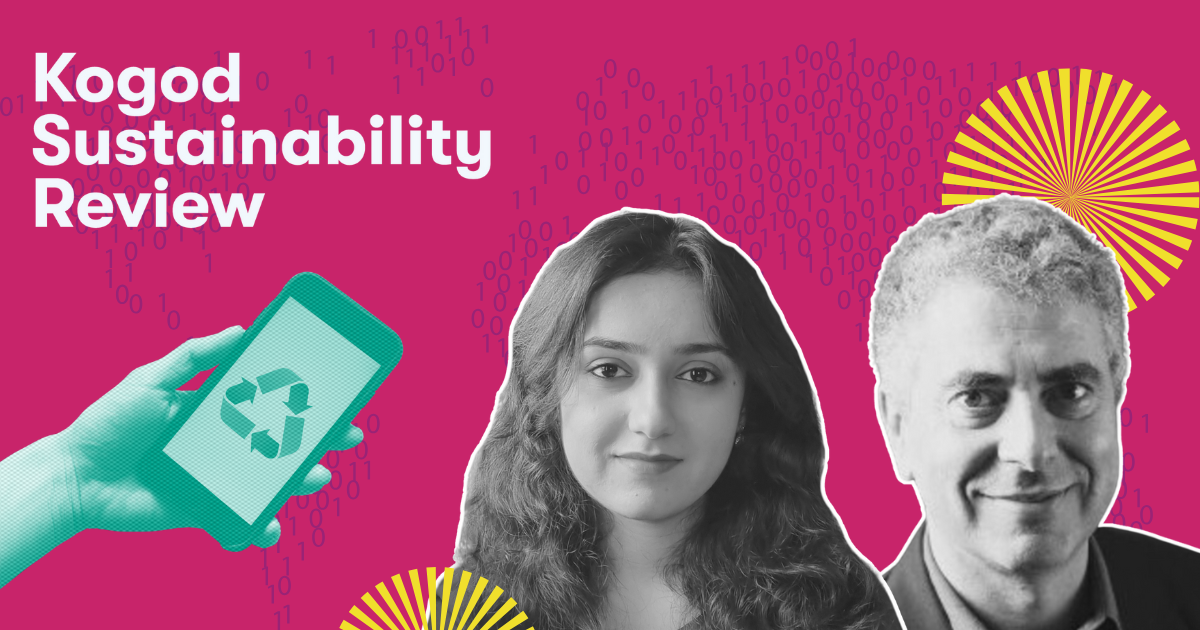
Naveen Ali
MS in Sustainability Management Student, Kogod School of Business
In an era where sustainability and digital transformation converge, the shift towards a circular economy has become imperative for businesses worldwide. To explore the intricate dynamics of this shift, I, Naveen Ali, spoke with Manuel Vexler, co-founder and executive director of the Actionable Knowledge Foundational Institute (AKFI). I’m currently a Master's in Sustainability Management student at American University, and I have been working as a researcher with AKFI for the past two years on a white paper that explores the roles, responsibilities, and mandates of Chief Sustainability Officers. globally. This collaboration has provided hands-on experience in Enironmental, Social, Governance (ESG) and circular economy projects, and I am thrilled to share Vexler’s insights with the larger AU community, including opportunities for students to get directly involved with the circular economy.
With a rich background in technology, business strategy, and sustainability, Vexler offers a unique perspective on how organizations can effectively transition to circular models while driving social and economic value.
Can you share your background and how you became a sustainability professional?
"My journey into sustainability began with a passion for digital transformation and AI," says Vexler, whose career has spanned senior roles at AMD, Cisco, and Huawei. These experiences allowed him to combine his expertise in ICT (Information and Communications Technology) with a commitment to sustainable development. As co-host of the "Actionable ESG Talks" series and a visiting lecturer at Cornell University, Vexler continues to mentor the next generation of leaders in sustainability and digital transformation.
What sets AKFI apart from other sustainability industry associations?
AKFI stands at the forefront of integrating sustainability, ESG principles, and digital transformation. According to Vexler, “AKFI provides a collaborative platform where enterprises can bridge the gap between technological innovation and sustainability goals.” The organization focuses on creating actionable standards that enhance supply chain efficiency, minimize waste, and promote transparency across industries.
Can you share any projects AKFI has been working on?
One of AKFI's flagship initiatives is the whitepaper titled “Sustainable Synergy: Bridging the Reporting Gap between Tire and Car Manufacturers.” This project emphasizes the importance of aligning sustainability reporting within the automotive supply chain, which enhances transparency and accountability. “By promoting lifecycle management and resource efficiency, this project is a step forward in reducing environmental impact,” Vexler explains.
What advice do you have for companies looking to embrace circular economy practices?
Vexler advises companies to start with a comprehensive assessment of their existing processes as transitioning to a circular economy is challenging due to existing infrastructure limitations and the need for cultural shifts. Many companies still rely on linear systems that are not designed for circular practices like recycling or resource recovery, making retrofits costly and complex. Additionally, there may be resistance to change among employees and stakeholders who are comfortable with established processes. Overcoming this requires clear communication and changing management strategies to build support for new initiatives.
Can you elaborate on the role of double materiality in corporate decision-making?
First, we need to understand what materiality means, “Information is materials if omitting, misstating or securing it could reasonably be expected to influence investor decision.¹” Double materiality is a forward-looking concept that broadens corporate decision-making beyond traditional financial considerations.
Rather than focusing solely on how external sustainability issues impact their bottom line (financial materiality), companies are encouraged to assess the effects their operations have on the environment and society (environmental and social materiality)."

Naveen Ali
MS in Sustainability Management Student, Kogod School of Business
Vexler notes, “By applying double materiality, companies gain a holistic view of their operations, enabling them to identify risks and opportunities that might otherwise go unnoticed.”
How can companies use double materiality to prioritize circular economy initiatives for maximum impact?
By applying double materiality, companies can effectively assess which circular economy initiatives—such as recycling, resource efficiency, and lifecycle management—will yield the most significant benefits. This involves evaluating how sustainability efforts influence financial performance and, conversely, how financial strategies impact environmental and social outcomes. With this integrated approach, businesses can prioritize projects that align with both profitability and sustainability goals, ensuring efficient resource allocation. Ultimately, this dual focus not only enhances financial performance but also contributes to long-term resilience and alignment with global sustainability standards, creating a balanced path toward sustainable growth.
How does AKFI help companies align with emerging regulatory requirements?
With frameworks like the EU Corporate Sustainability Reporting Directive (CSRD) gaining traction, companies are now required to adopt double materiality in their reporting. AKFI supports its members by providing insights and standards to navigate these regulatory changes, fostering transparency and reducing compliance costs. Vexler emphasizes, “Standardizing reporting processes not only enhances accountability but also reduces the administrative burden on suppliers.”
Looking Ahead: AKFI's Vision
As AKFI continues to expand its influence, the organization remains dedicated to bridging the gap between sustainability and digital transformation. By fostering collaboration among industry leaders, AKFI is not just setting standards but also empowering businesses to embrace a sustainable future.
AKFI also believes in supporting the next generation of sustainability professionals. Building on the success of partnerships such as my research with AKFI, the organization is now opening up volunteer-based internships that students can use for course credits, offering a unique opportunity to gain practical skills while making a meaningful impact.
For more insights into AKFI's initiatives and resources, visit akfi.org.
References
1. AMENDMENTS TO IAS 1 AND IAS 8 – DEFINITION OF MATERIAL INTERNATIONAL FINANCIAL REPORTING BULLETIN, August 2018, BDO, https://www.bdo.global/getmedia/f936abdb-e2ee-4faf-b7cf-4a4ddec535f8/IFRB-2018-08-Definition-of-Material.aspx#:~:text=Materiality%20depends%20on%20nature%20or,magnitude%20of%20information%20(or%20both)
